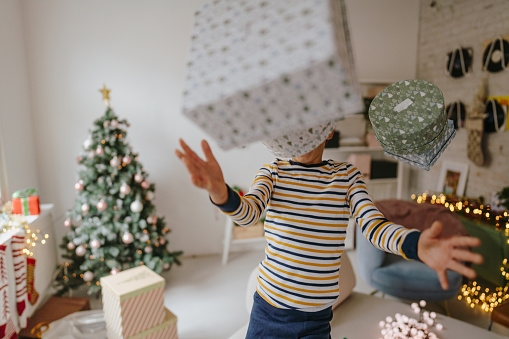How much is TOO MUCH for kids at Christmas?
December 14th, 2020
2477 Views

Christmas is fast approaching and the whole family will be getting excited! Christmas is a magical time of year for young and old alike and parents want to give their children a magical Christmas. Nothing beats that moment of delight when children wake early on Christmas morning to find their Christmas stockings bulging with presents! Santa has been and managed to squeeze himself down the chimney, deliver all the presents and polish off his glass of milk and plate of cookies!
The trouble is that for many parents, it is a time of anxiety too as they fret about how much they spend on their kids and how many gifts they should have to open etc. etc. A recent survey in the United States has determined that the average family will be spending $998 (£743) on presents which is an ‘ awful lot of bananas’ especially as this year has been an incredibly difficult one with COVID, furlough schemes and unemployment.
If your child really is set on the idea of a certain expensive toy, which you cannot afford, you can give them some money towards it and get other family members to do the same. With plenty of encouragement your child can save up the money that is needed. The golden rule is to make this fun! Buy a small, modest gift that your child can unwrap on Christmas Day and give them some money towards their ‘dream toy’ in a fun way. You can pop a load of coins in a new piggy bank or give a row of one pound coins sellotaped in a row and wrapped in a separate little parcel! Kids love to unwrap presents on Christmas Day and are usually oblivious of the value of them. Nothing though is so disappointing as receiving a pile of envelopes containing money – true the money is vital for the ‘dream toy slush fund’ but your child still needs a few fun presents such as a balloon animal kit, to have fun with. Ensure relatives who are kindly giving money, also buy a ‘little something’ to open – with clever shopping you can get something fun for very little!
The trouble is that for many parents, it is a time of anxiety too as they fret about how much they spend on their kids and how many gifts they should have to open etc. etc. A recent survey in the United States has determined that the average family will be spending $998 (£743) on presents which is an ‘ awful lot of bananas’ especially as this year has been an incredibly difficult one with COVID, furlough schemes and unemployment.
Set your budget
Even if you have already started amassing presents for your kids, have you set your budget? It is essential to have a realistic budget in place and even more essentially, to stick to it! There is absolutely no point in pushing yourself to get the latest incredibly expensive ‘must have’ toy and going into debt because of it! As well as setting a budget, many parents decide how many ‘large‘ presents their children will have and the number of small ones.If your child really is set on the idea of a certain expensive toy, which you cannot afford, you can give them some money towards it and get other family members to do the same. With plenty of encouragement your child can save up the money that is needed. The golden rule is to make this fun! Buy a small, modest gift that your child can unwrap on Christmas Day and give them some money towards their ‘dream toy’ in a fun way. You can pop a load of coins in a new piggy bank or give a row of one pound coins sellotaped in a row and wrapped in a separate little parcel! Kids love to unwrap presents on Christmas Day and are usually oblivious of the value of them. Nothing though is so disappointing as receiving a pile of envelopes containing money – true the money is vital for the ‘dream toy slush fund’ but your child still needs a few fun presents such as a balloon animal kit, to have fun with. Ensure relatives who are kindly giving money, also buy a ‘little something’ to open – with clever shopping you can get something fun for very little!
Build Christmas traditions
These are what makes Christmas special. If you think back to Christmases you enjoyed as a child only a few of the presents will come to mind, but all the family traditions will remain as crystal clear memories! If your children are small, you can continue the traditions from your childhood and create some new Christmas traditions too. Traditions can be really varied such as always have porridge with a swirl of chocolate on Christmas morning, everyone gathering in the lounge to open their Christmas stockings together or opening stockings in the morning and tree presents after lunch.
Set expectations
If you are having a particularly tough year (and many families are) it is best to mention it to your children so that they know early on that the very latest mobile phone will not be wrapped and waiting for them under the Christmas tree. This point needs to be made now, not on Christmas morning so that your child has the time to fully understand the situation. This will lessen the chance of being faced by a miserable unhappy child who could make Christmas memorable for all the wrong reasons!Accentuate your Christmas values.
Whilst some people feel that a good Christmas is one with a pile of expensive presents to be opened. Many others believe that Christmas is a spiritual time to mark the birth of Jesus Christ and that it is the perfect time to do something worthwhile for the local community such as helping a charity, visiting a lonely person or helping a family in need. It is important to focus on your beliefs as a family and for your children to learn from you. If your supermarket has a food collection for needy families, what a perfect way to teach your child about the difficulties faced by so many. Let them choose the cans you are going to donate and let them be the ones to hand them to the volunteers.It is important to remember that your child will learn so much from you – without ever being told….

Remember to always say ‘thank you’
As a child, my Nana told me that ‘a gift isn’t a gift until you have said thank you for it’ . In those days we spent hours writing thank you letters for our presents and sadly this gesture has now been overlooked by many. Get your children to ring elderly relative to say thank you and have a Christmas chat or have fun composing thank you emails together for family and friends. Even if the gift is not quite what your child was hoping for, they must appreciate the time and effort that went into choosing it for them.Children will learn plenty about presents as they watch you opening your gifts and how you react – make light of things if Granny has bought you socks again or got the size wrong and let your kids hear you saying a lovely thank you all the same!
The pleasure of giving
It is important that your children learn about the flip side of Christmas presents – about the fun of choosing or making presents and also the joy these presents will bring. Get your children involved in making Christmas cards or tags and teach them that is the thought that goes into a present that counts - not its financial value.Unfortunately, as children grow, so do their expectations and peer pressure increases too, this can be difficult for kids to handle but they need to realise that they will not always be able to have the latest, flashiest everything for Christmas or at other times of the year and everyone has things they wished they had been given, but important though it was at the time, they got over the disappointment and carried on…
Have a lovely Christmas….
Chrissie x

